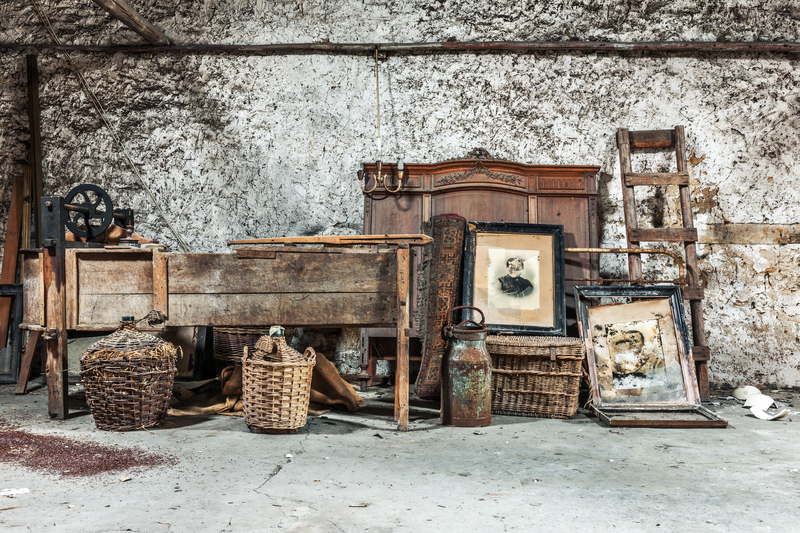Top methods to declutter your home before a move
Posted on 22/05/2025
Top Methods to Declutter Your Home Before a Move
Moving to a new home is an ideal opportunity to simplify your life and enjoy a fresh start. However, the decluttering process can seem daunting when surrounded by years of accumulated belongings. Fortunately, with the right strategy, you can streamline your move and create a more organized, harmonious space in your new abode. In this comprehensive guide, we'll reveal the top methods to declutter your home before a move, ensuring a smooth, stress-free transition.

Why Decluttering Before a Move Is Essential
For many, moving is synonymous with chaos, stress, and seemingly endless boxes. Decluttering before a move isn't just about lightening your load--it's a chance to reset and prioritize what truly matters. Here are a few key reasons why you should declutter your home ahead of moving:
- Saves Money: Fewer items mean lower moving costs, as you'll need fewer boxes and less space on the moving truck.
- Less Packing & Unpacking: By bringing only what you need, you minimize packing time and avoid unnecessary clutter in your new home.
- Makes Unpacking Easier: Settling in becomes less overwhelming when you have fewer items to organize.
- Fresh Start: Letting go of unused or unwanted belongings allows you to create a more purposeful, clutter-free environment.
- Charitable Giving: You'll have the chance to donate items you no longer need to those who do.
Ready to tackle your move with confidence? Let's dive into proven methods to declutter before relocating so you can turn the page smoothly and efficiently.
1. Develop a Decluttering Plan
The foundation of every successful decluttering project is a well-thought-out plan. Before you begin, set aside dedicated blocks of time leading up to your move. Start early, ideally at least a month in advance.
- List all areas: Walk through your home and write down every area or room that needs attention--don't forget the garage, attic, and closets!
- Set realistic goals: Establish daily or weekly targets (e.g., "declutter the kitchen on Saturday" or "clean out the wardrobe by Sunday").
- Gather supplies: Prepare boxes, bags, markers, and a notebook to aid in sorting and decision-making.
- Enlist help: Involve family members from the start for faster progress and better morale.
Pro Tip: Use a timer to keep yourself focused. Try the Pomodoro Technique--set a timer for 25 minutes and rest for five minutes between decluttering sessions.
2. Sort Your Belongings with the Four-Box Method
One of the most effective home decluttering methods is the Four-Box Technique. Working one room at a time, label four boxes or bags:
- Keep: For items you use and love, essential for your new home.
- Donate: Gently used items in good condition, ready for charity.
- Sell: Valuable belongings you might want to list online or at a yard sale.
- Toss: Broken, outdated, or unusable items for disposal.
As you declutter before moving, ask yourself:
- Have I used this in the past year?
- Do I have multiples of the same item?
- Would I buy this again?
- Does it add value or joy?
3. Focus on High-Impact Decluttering Zones
When you're short on time, tackle the most clutter-prone areas first for maximum impact. These spaces usually contain items you can easily downsize:
- Closets and Wardrobes: Remove clothing that no longer fits, is out of style, or hasn't been worn in the last year.
(Donate, sell, or recycle responsibly.) - Kitchen: Discard expired food, duplicate utensils, and unused gadgets. Pare down to the essentials for cooking and serving.
- Garage and Attic: Sort seasonal items, old tools, and forgotten sports equipment. Be honest about what you'll realistically use again.
- Bookshelves: Keep favorite books and donate the rest to libraries, schools, or communities.
- Bathroom: Toss expired medications, old makeup, and unused bath items.
4. Use the Marie Kondo Method ("KonMari")
Inspired by organizing expert Marie Kondo, the KonMari Method has gained international acclaim as one of the leading ways to declutter your home before a move. Here's how to harness its power:
- Keep Only What Sparks Joy: Take each item in your hands and ask if it brings you happiness. If not, thank it for its service and let it go.
- Tidy by Category, Not Room: Instead of decluttering room-by-room, focus on categories such as clothes, books, papers, and sentimental items--making decisions easier and progress quicker.
- Create Lasting Habits: Once you've moved, maintain an organized home by periodically revisiting the process.
- Bonus: The benefits aren't just physical--many find the KonMari approach helps improve mental clarity and reduce stress before, during, and after a move.
5. Hold a Pre-Move Garage Sale or List Items Online
Make the most of unwanted but valuable possessions by selling them. This not only reduces clutter but can also help offset moving costs:
- Hold a Garage Sale: Invite neighbors and friends--advertise on community boards and digital platforms for more visibility.
- Use Online Marketplaces: Leverage platforms like Craigslist, Facebook Marketplace, OfferUp, or eBay to reach a broader audience.
- Be Realistic with Pricing: Research buying trends and list items competitively for quicker sales.
- Bundle Items: Group smaller items together for increased appeal and faster clearance.
Tip: Use clear, well-lit photos and write honest descriptions to attract genuine buyers.
6. Donate Responsibly
Many gently-used items that no longer suit your needs can benefit others. Before moving, consider:
- Charity Shops and Thrift Stores: Organizations such as Goodwill, Salvation Army, or local shelters often accept a wide range of items.
- Community Resources: Schools, churches, and libraries may appreciate book, toy, or clothing donations.
- Specialized Donations: Animal shelters may need old towels and bedding; food pantries accept non-perishable goods.
Check donation guidelines in advance as some locations restrict what they can accept. Be sure items are clean and in usable condition.
7. Dispose and Recycle Safely
For items that can't be donated or sold, dispose of them responsibly:
- Hazardous Materials: Paint, electronics, and cleaning supplies require special disposal--contact your local waste authority for drop-off dates and safety rules.
- Bulk Trash Days: Schedule pickups for large furniture and non-recyclable items.
- Recycle: Sort paper, cardboard, plastics, and metals to reduce landfill waste before moving day.
Never dump items illegally. Environmentally conscious disposal is crucial for a responsible move.
8. Digitize Where Possible
In today's digital age, minimizing physical clutter is easier than ever:
- Scan Documents: Convert paper files and receipts to digital formats to save space.
- Back Up Memories: Digitize old photographs, home videos, and slides for safekeeping and easy transport.
- Simplify Media: Move music, movies, and eBooks to cloud storage or portable drives.
Fewer boxes of files mean less to carry, and digital backups provide peace of mind.
9. Involve Your Family in the Decluttering Process
Moving affects the entire household, so enlist help and create shared responsibility:
- Assign Tasks: Give children age-appropriate jobs--like sorting toys and books--to foster a sense of control and participation.
- Set Decluttering Challenges: Make it fun! Offer rewards for reaching goals or for the most items donated or sold.
- Share Memories, But Limit Nostalgia: Take photos of sentimental items before parting with them to preserve memories without the clutter.
Tip: Discuss the move positively, focusing on the excitement of a new adventure together.
10. Address Common Decluttering Roadblocks
Decluttering is a process, and it's normal to feel overwhelmed. Here are ways to overcome common challenges:
- Sentimental Items: Limit keepsakes to one box per person and select only the most meaningful items.
- "Just-in-Case" Hoarding: Be honest about what you'll really use--let go of duplicates and outdated gadgets.
- Time Crunch: If short on time, focus on the essentials and store the "maybe keep" items in a box to revisit once you've settled in your new place.
Remember, perfect is not the goal--progress is!
Benefits of Decluttering Before Changing Homes
- Less to Pack and Move: Moves are less stressful when you're not drowning in boxes of unnecessary stuff.
- Lower Moving Costs: Save money on packing supplies, movers, and transportation.
- Faster Move-In: With less clutter, organizing your new home is a breeze.
- Positive Mindset: Shedding excess belongings brings clarity and focus for a fresh start.
- Increased Value: If you're selling your home, a clutter-free environment shows better to potential buyers.
Final Checklist: Declutter Your Home Before Relocation
- Start early--set a timeline and stay consistent.
- Work one area at a time for focus and momentum.
- Sort using "keep, donate, sell, toss."
- Be ruthless: Only keep items you need, use, or love.
- Sell or donate valuable, useful belongings.
- Dispose of hazardous and bulky items responsibly.
- Digitize where possible.
- Celebrate progress and reward yourself for tackling tough areas.
Decluttering before a move is more than just a physical process--it paves the way for an organized, purposeful life in your new home. By following these top methods--from sorting systematically to letting go with gratitude--you'll enjoy a lighter, brighter move and set the stage for your next chapter.

Frequently Asked Questions: Decluttering Before a Move
How far in advance should I start decluttering before a move?
Ideally, begin at least one month before your moving date--earlier if possible. This allows ample time to sort, sell, donate, and dispose of unwanted items without last-minute stress.
Can I declutter and pack at the same time?
Yes! Many people prefer to declutter by category or room, then pack items as they're sorted. This creates momentum and makes the process more efficient. Remember, don't pack what you don't want in your new home!
What items should I never declutter before moving?
Vital documents (passports, birth certificates), family heirlooms with deep personal meaning, essential medical supplies, and everyday necessities should all come with you. Be wary of discarding irreplaceable items or things you'll need during the move.
Should I hire a professional organizer before moving?
If you're overwhelmed, professional organizers can speed up the process and provide expert tips. However, with clear goals and a plan, most people can successfully declutter before relocating on their own.
Conclusion
A well-executed pre-move decluttering not only saves time, money, and energy, but also offers you a more relaxed, enjoyable moving experience. With these top methods to declutter your home before a move, you'll set yourself up for success--ensuring your new house truly becomes a home.
Take the leap! Declutter, donate, and delight in a smoother transition. Your new, organized life awaits.
Latest Posts
Create Order in Chaos: Packing Innovation for Moving
Moving Your Bed and Mattress with Ease and Efficiency
Dominating Heavy Lifting Without Assistance

_result.jpg)
_result.jpg)




